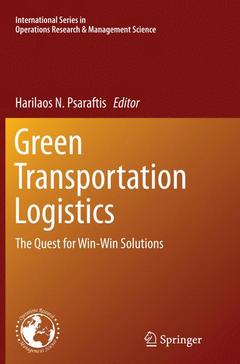Description
Green Transportation Logistics, Softcover reprint of the original 1st ed. 2016
The Quest for Win-Win Solutions
International Series in Operations Research & Management Science Series, Vol. 226
Coordinator: Psaraftis Harilaos N.
Language: English
Subjects for Green Transportation Logistics:
Publication date: 10-2016
Support: Print on demand
Publication date: 07-2015
558 p. · 15.5x23.5 cm · Hardback
Description
/li>Contents
/li>Biography
/li>Comment
/li>
This book examines the state of the art in green transportation logistics from the perspective of balancing environmental performance in the transportation supply chain while also satisfying traditional economic performance criteria. Part of the book is drawn from the recently completed European Union project Super Green, a three-year project intended to promote the development of European freight corridors in an environmentally friendly manner. Additional chapters cover both the methodological base and the application context of green transportation logistics.
Individual chapters look at the policy context; the basics of transportation emissions; Green Corridors basics; the concept of TEN-T (Trans-European Network); Benchmarking of green corridors; the potential role of ICT (Information and Communication Technologies); Green vehicle routing; Reducing maritime CO2 emissions via market based measures and speed and route optimization; Sulphur emissions; Lifecycle emissions; Green rail transportation; Green air transportation; Green inland navigation and possible areas for further research.
Throughout, the book pursues the goal of ?win-win? solutions and analyzes the phenomenon of ?push-down, pop-up?, wherein a change in one aspect of a problem can cause another troubling aspect to arise. For example, speed reduction in maritime transportation can reduce emissions and fuel costs, but could require additional ships and could raise in-transit inventory costs. Or, regulations to reduce sulphur emissions may ultimately increase CO2 elsewhere in the supply chain. The book takes stock at the various tradeoffs that are at stake in the goal of greening the supply chain and looks at where balances can be struck.
Harilaos N. Psaraftis
Since May 2013 Harilaos N. Psaraftis is Professor of Transport Optimization at the Department of Transport of the Technical University of Denmark (DTU). He has a diploma from the National Technical University of Athens (NTUA, 1974), and two M.Sc. degrees (1977) and a Ph.D. (1979) from the Massachusetts Institute of Technology (MIT). He was a faculty member at MIT from 1979 to 1989 (Department of Ocean Engineering), receiving tenure there in 1985. In the period from 1989 to 2013 he was Professor of Maritime Transport at the School of Naval Architecture and Marine Engineering and Director of the Laboratory for Maritime Transport at NTUA.
Psaraftis's main interests are in transportation logistics, with a focus on sustainability issues in recent years. At MIT he headed some 11 research projects on various subjects including ship routing and scheduling, dial-a-ride systems and oil spill response. At NTUA he led some 30 projects in practically all areas of maritime transportation. Among the 20 or so EU projects he was involved in, he has coordinated 3 multi-partner EU consortia, including project Super Green on European Green Corridors (2010-2013). At DTU he leads a new project on mitigating and reversing the impact of environmental legislation on the Ro-Ro sector in Northern Europe, funded by the Danish Maritime Fund (2015-2017).
Psaraftis’s published work includes 3 books, 18 book chapters, over 135 articles in refereed journals and conferences, over 150 talks in various other conferences and over 100 other publications. He has chaired several international conferences and organized several conference sessions and clusters on topics such as logistics, vehicle routing and scheduling, maritime and intermodal transportation, ports, and maritime safety, security and environmental protection and is on the editorial board of several journals, including Transportation Science since 1987. He is amember of INFORMS




